To appeal to all those who are growing older—at every age—we suggest some of the best new books on aging, as well as many classics. You’ll find everything from caregiving advice to memoirs, from humor to reflection, plus narratives by authors who set out, in midlife, in search of wisdom and new ways to think about growing older.
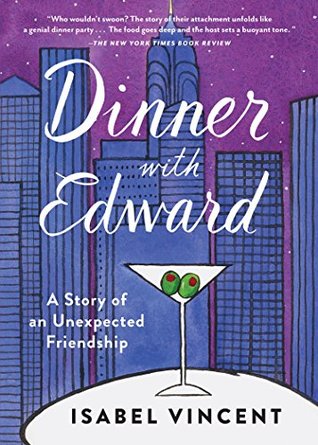 Dinner with Edward: A Story of an Unexpected Friendship Posted in: Memoirs
Dinner with Edward: A Story of an Unexpected Friendship Posted in: MemoirsBy Isabel Vincent – Algonquin Books, 2016
Edward is a bereft widower in his 90s; Isabel is a middle-aged reporter whose marriage is on the rocks. As a favor to his out-of-town daughter, Isabel agrees to look in on Edward to make certain he honors his promise to his late wife: to keep on living after she’s gone. Edward’s marriage was a sweet, sad love story that he shares with Isabel over dinners—menus included at the top of each chapter—that he meticulously prepares, which leave the reader salivating at the imagery. Isabel confides in Edward as well. There’s a special connection as both have lost spouses, but Edward’s antidote is the slow and thoughtful creation of these exquisite meals, and the joy of sharing them with others. The time they spend together has Isabel rethinking her life; she now savors, where she once was indifferent. A dear gem of a little memoir that may have you looking for an Edward of your own.
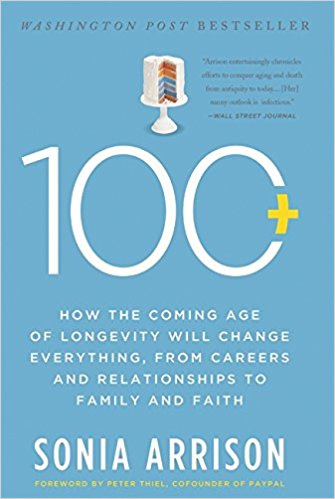 100 Plus: How the Coming Age of Longevity Will Change Everything, From Careers and Relationships to Family and Faith Posted in: Insights from Bold Thinkers
100 Plus: How the Coming Age of Longevity Will Change Everything, From Careers and Relationships to Family and Faith Posted in: Insights from Bold ThinkersBy Sonia Arrison – Basic Books, 2011
Longevity experts suggest that the first person who will live to 150 has already been born. If you knew that person was you, would you do anything differently? What would you study in school? When would you start your family? How would you invest? In 100 Plus, we meet the scientists and thought leaders who are the catalysts for the increased health spans of tomorrow. There are no snake-oil salesmen here. Arrison has written a provocative and easy-to-understand work that covers the science and technologies of superlongevity, addressing the likely impacts on religion, childbearing, education and employment. We learn not only what might happen to our bodies but what stands to occur in our societies as we attain longer life. Prepare to be enlightened or maybe terrified—the possibilities could challenge us to rethink what we thought we knew about generations to come.
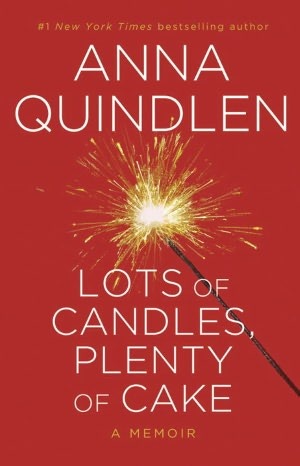 Lots of Candles, Plenty of Cake Posted in: Guides to Aging Well, Memoirs
Lots of Candles, Plenty of Cake Posted in: Guides to Aging Well, MemoirsThis Pulitzer Prize-winning author and journalist has a knack for telling her life story as though she is talking to an old friend in this memoir on turning 60. Whether looking to the future or glancing back, Quindlen writes with humor, comfort and hope about motherhood (the challenges of raising teens versus raising children), overcoming loss (her mom died when Quindlen was 19) and marriage (and the white lies that save hers). With typical candor, she writes about her gratitude for the opportunities she’s had, thanks in part to the women’s movement, the changing role religion played in her life, and her thoughts on aging and retirement. The appeal to midlife women is great, but there is a universality to her ruminations that gives her writing a mirror-like quality to women of any age. Best read as stand-alone essays to give the messages time to resonate, Anna Quindlen is better than therapy.
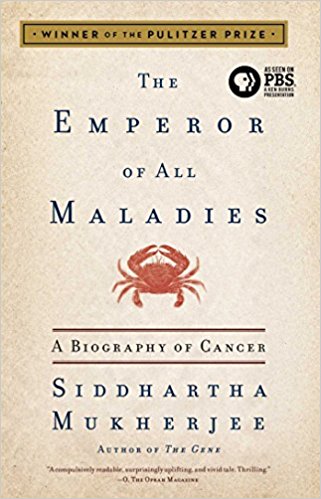 The Emperor of All Maladies: A Biography of Cancer Posted in: Insights from Bold Thinkers
The Emperor of All Maladies: A Biography of Cancer Posted in: Insights from Bold ThinkersBy Siddhartha Mukherjee – Scribner, 2010
In this fascinating, exhaustively researched volume, the author takes on the disease that has destroyed—and intrigued—humans since the start of recorded time. Mukherjee is an oncologist, medical educator and clinical researcher. His book is “an attempt to enter the mind of this immortal illness.” And so he does, tracing the history of cancer through extraordinary personalities and their work, including Sidney Farber, father of chemotherapy, philanthropist Mary Lasker and William Halsted, who developed the modern mastectomy. Case histories movingly illustrate his points. One of the most poignant is of a woman named Germaine, whose suffering taught Mukherjee that “to keep pace with this malady, you needed to keep inventing and reinventing, learning and unlearning strategies.” In 2015, PBS released a documentary based on the book, created by filmmaker Ken Burns.
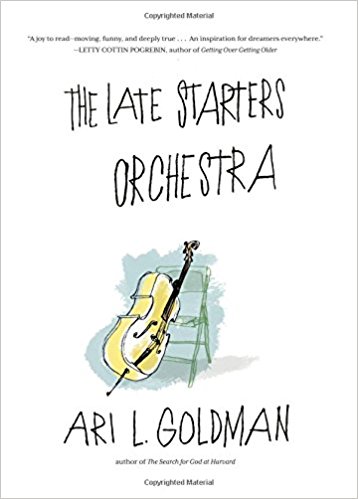 The Late Starters Orchestra Posted in: Guides to Aging Well
The Late Starters Orchestra Posted in: Guides to Aging WellBy Ari L. Goldman – Algonquin Books, 2014
As a boy, best-selling author Ari Goldman made memories by singing at synagogue with his father. But in high school and university, Goldman put his energy into writing, not music. He got a low-level newspaper job and worked his way up. At 26, missing the joy music had brought to his life, he found a teacher who promised that learning to play the cello would “bring back his voice.” Goldman did not stick with it then, but in his late 50s set a goal that he would play the cello at his 60th birthday party. He accomplished this feat in part due to the Late Starters Orchestra (LSO), where adults of every description gather weekly in an old New York City coat factory with musical instruments, all committed to learning to play later in life. From the LSO and Goldman, we learn that taking up a challenge even when you’re older can be incredibly rewarding. This is a story of perseverance and hope for all readers, no matter your age.
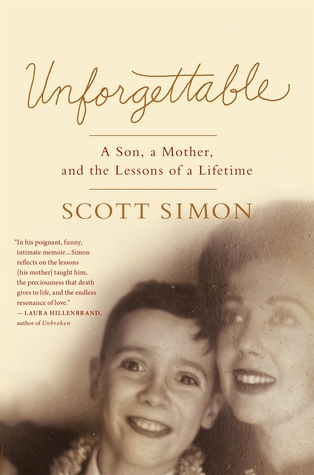 Unforgettable: A Son, a Mother and the Lessons of a Lifetime Posted in: Life’s Endings, Memoirs
Unforgettable: A Son, a Mother and the Lessons of a Lifetime Posted in: Life’s Endings, MemoirsNational Public Radio’s “Weekend Edition Saturday” host Scott Simon made headlines in 2013 with his tweets from his dying mother’s ICU bedside, taking followers along for this most intimate journey. Patricia Simon Newman, a glamorous, mischievous and resourceful woman, made the most of life’s challenges and found good in every person she met. And what a cast of characters that was. She married three times and had many loyal friends as she raised her only son. Simon’s tweets ignited debate over whether or not such a personal moment should be shared on social media (most followers were both moved and supportive, while others were outraged), but the book draws us into the saga of a son’s devotion and a family’s shared memories. The memoir takes place between the tweets, unique and universal at the same time. Simon’s homage to his remarkable mother is a warm and life-affirming read.
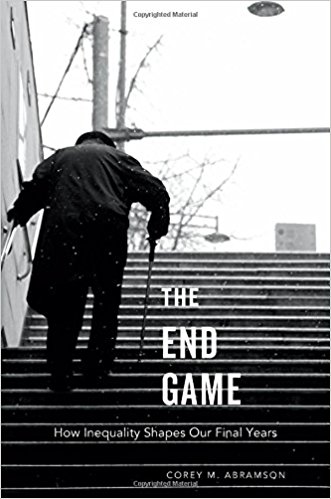 The End Game Posted in: Insights from Bold Thinkers
The End Game Posted in: Insights from Bold ThinkersWe are all growing older, but we are not all aging on equal terms, says University of Arizona sociologist Corey M. Abramson in The End Game. With deeply detailed interviews of a diverse cast of adults aging in California’s Bay Area, Abramson gives readers a very personal view of how disparate education and economics have created what he calls an alarming “geriatric inequality” in America. The interviewees’ real-world experiences illustrate that people aging in middle-class neighborhoods have better housing, transportation, access to health care, social support—even groceries—than those in poorer communities, and that this imbalance has a direct impact on whether a person thrives or simply survives in the later years. Abramson challenges society to consider older adults as individuals rather than as a one-size-fits-all block, because, he says, what affects our elders today eventually affects us all.
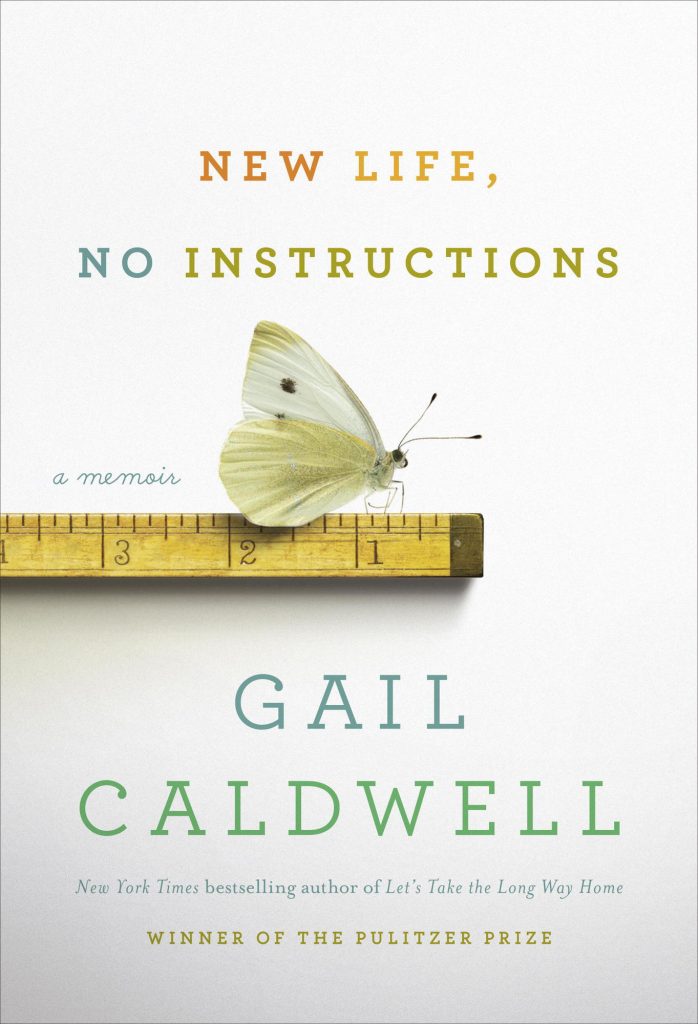 New Life, No Instructions: A Memoir Posted in: Memoirs
New Life, No Instructions: A Memoir Posted in: MemoirsWhat do you do when your story changes at midlife? That’s what Gail Caldwell asked herself in 2011 as she faced major surgery with a long recovery and uncertain outcome. Never married, Caldwell was approaching 60 with no children—but with a young, active dog.In this memoir, Caldwell recalls how she drew strength from a lifetime of overcoming the challenges of disease and addiction. A polio survivor, she hoped this surgery would alleviate chronic pain and possibly lengthen her right leg, which was an inch and a half shorter than her left. The “family” she created for herself over the years surrounded her during recovery. Her Samoyed, Tula—with her live-in-the-moment canine ways—inspired Caldwell to get back on her feet and out to the dog park, where she experienced life from a new vantage point, pain-free. This is a reminder of how a fighting spirit, a solid social network and a good dog can make all the difference in life.
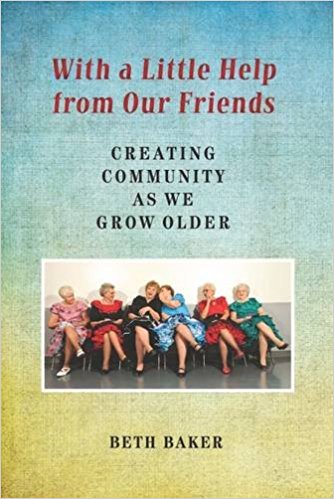 With a Little Help from Our Friends: Creating Community as We Grow Older Posted in: Guides to Aging Well, Insights from Bold Thinkers
With a Little Help from Our Friends: Creating Community as We Grow Older Posted in: Guides to Aging Well, Insights from Bold ThinkersWill your current home be the right place for you to live out your days? If you’re thinking of relocating—or helping someone else to do so—and hope to find the best living arrangements for aging well, look no further than this book. You may be surprised at the unique ways people are thinking about “community” today. Baker explores the cultural shift that offers older people many models beyond residential care: cohousing, aging in place, living among people with shared interests, to name but a few. She thoughtfully explains the positives and the shortcomings and includes anecdotes from people who’ve chosen each lifestyle. Baker even includes questions to ask before signing contracts, suggestions on how to pay and, if needed, guidance for finding supplemental care. This is a well-researched and illuminating peek into what’s just around the bend for both individual and community.
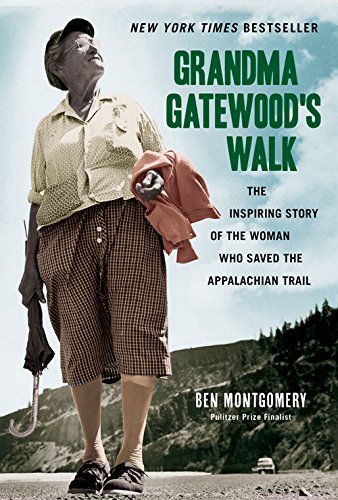 Grandma Gatewood’s Walk: The Inspiring Story of the Woman Who Saved the Appalachian Trail Posted in: Inspiring Journeys
Grandma Gatewood’s Walk: The Inspiring Story of the Woman Who Saved the Appalachian Trail Posted in: Inspiring JourneysBy Ben Montgomery – Chicago Review Press, 2014
In 1955, Emma Gatewood became the first woman to hike the 2,168-mile Appalachian Trail in its entirety in a single season. Ben Montgomery, a distant relative, spins this inspiring tale of courage and determination from Gatewood’s diaries and her children’s recollections. “Grandma” Gatewood was 67 years old: mother to 11, grandmother to 23, divorced from her husband of 30 years and a survivor of domestic violence. Inspired by a National Geographic article that said no woman had accomplished the feat, she first tried in 1954 but was thwarted by broken eyeglasses. Not an experienced hiker by a long shot, Gatewood took no map or compass, not even a tent. She carried a handmade backpack with a blanket and a plastic shower curtain for the elements, relying on common sense and the kindness of strangers. She went on to hike the trail twice more, and her advocacy is credited for its rehabilitation for countless others to enjoy.
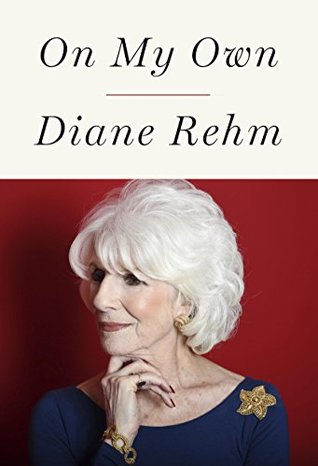 On My Own Posted in: Life’s Endings, Memoirs
On My Own Posted in: Life’s Endings, MemoirsBy Diane Rehm – Knopf, 2016
For more than 30 years, Diane Rehm, who is now 79, has been the gravelly voice (due to a condition called spasmodic dysphonia) of the “Diane Rehm Show” on National Public Radio. Syndicated across the United States, the two-hour news magazine focuses on politics and current affairs. But it’s Rehm’s private affairs that are the topic of this memoir, as she beautifully chronicles her husband’s passing, how she copes and what might lie ahead. Diane and John had been married 54 years when Parkinson’s disease left them with no place to turn when he asked for medical help to end his life. Rehm writes about the agonizing realization that John would have to starve himself. She shares her despair about his decision and her first year of widowhood—and anguishes about who will care for her when her time comes. Once she retires in 2017, Rehm promises she will spend her days advocating for the right-to-die movement.
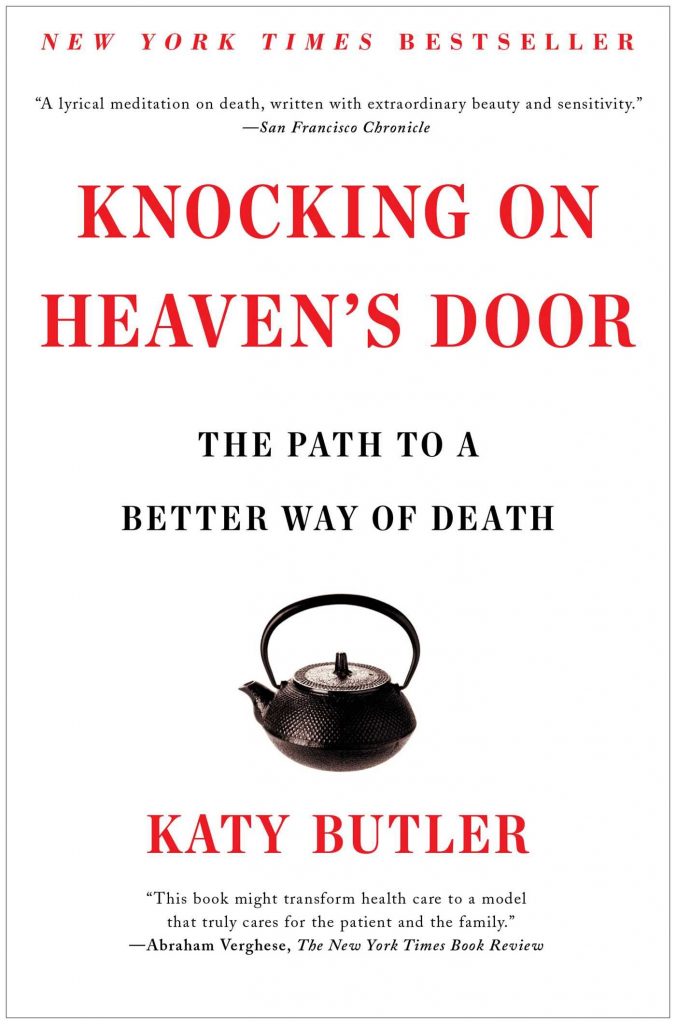 Knocking on Heaven’s Door: The Path to a Better Way of Death Posted in: Guides to Aging Well, Life’s Endings, Memoirs
Knocking on Heaven’s Door: The Path to a Better Way of Death Posted in: Guides to Aging Well, Life’s Endings, MemoirsBy Katy Butler – Scribner, 2013
In this honest mix of memoir and research, Katy Butler shares her family’s experience of illness and death in hopes that we can reclaim caregiving and dying from a broken health system. Butler’s father, Jeffrey, a World War II survivor and academic, suffers a massive stroke, followed by a pacemaker implantation—a hasty decision that will haunt the family for five years as his descent into dementia takes a devastating toll on Butler’s mother’s health. Butler lives across the country and finds herself part of the “roll-aboard generation” of adult children who spend years caregiving via plane and phone. When doctors deny her request to turn off the pacemaker, Butler struggles to navigate a health system designed around reimbursement and life-saving measures rather than quality of life and patient-centered care. An instruction manual for creating a good death, Heaven’s Door deserves serious attention not only from each of us but the entire US medical community.
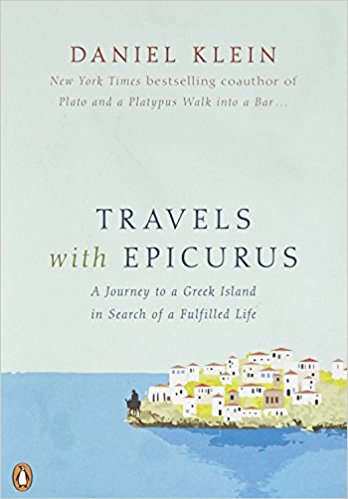 Travels with Epicurus: A Journey to a Greek Island in Search of a Fulfilled Life Posted in: Inspiring Journeys, Nonfiction
Travels with Epicurus: A Journey to a Greek Island in Search of a Fulfilled Life Posted in: Inspiring Journeys, NonfictionBy Daniel Klein – Penguin Books, 2012
A trip to the dentist forces the author to consider dentures or implants—neither particularly appealing to septuagenarian Daniel Klein. This is the catalyst for a trip of self-appraisal to the Greek island of Hydra. There Klein, enjoying a laid-back lifestyle, contrasts the notions of the great philosophers to contemporary views on aging. He discovers that to age authentically is to make peace with your circumstances and to savor what you have. Witty and philosophical, Klein finds a “fulfilled life” means something very different to a person in his 70s than it does to a younger man. His perspective is delightfully and thoughtfully shared within these pages.


